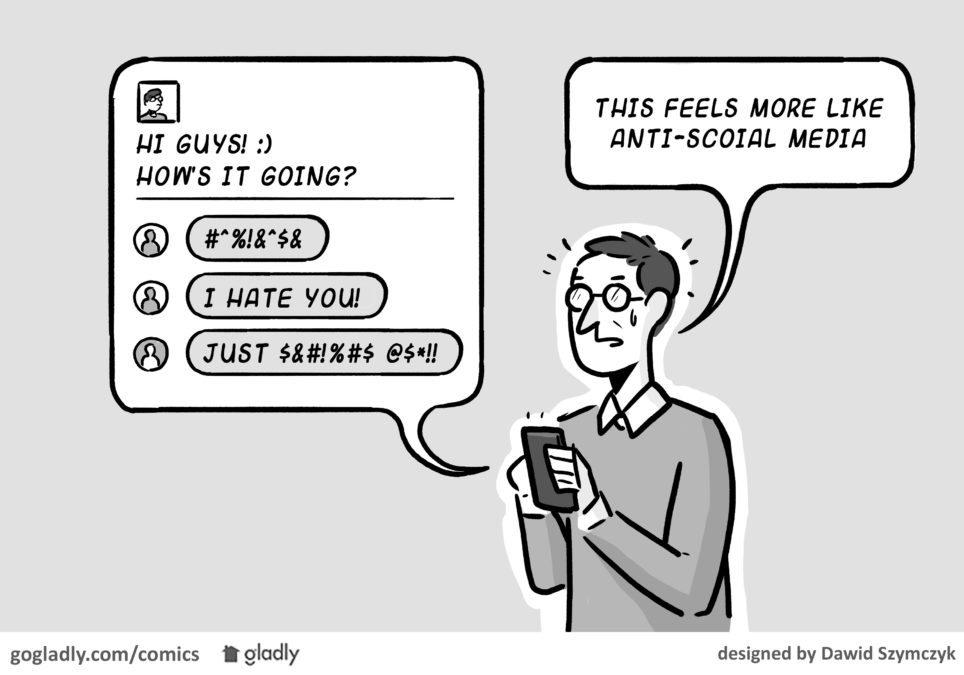Stop me if you’ve heard this one before.
Jane lives in an HOA and creates a social media group for her community as a way for neighbors to get to know each other and to find out what’s going on.
It works great… at first. But pretty soon this HOA social media takes a turn when a few people sign up who decide to use it as a platform to wage their own personal battles. They make accusations and personal attacks. They are loud and rude.
Before long, most of Jane’s nice neighbors won’t use the online community at all because it’s not a friendly place. Her HOA board of directors hates it and has asked her to remove it. The HOA’s attorney says that some of the statements on the forum are defamatory.
This isn’t how it goes with every community association, but chances are high that this story is familiar if you’ve ever managed HOAs.
Why does social media so frequently go sour in HOAs when it works great in most non-HOA neighborhoods? Can the problem be solved? Or should community associations just avoid social media altogether?
These problems can be resolved and the risks can be mitigated. If done right, social media is the best way to communicate in your community.
Don’t Give Up! Other Industries Have Solved These problems
While HOAs and condos do have their own unique set of problems, trouble with civility in online communities is very common. Other industries have solved these very problems. Here are some general principles that we can apply.1
-
Encourage Voluntary Compliance
Most people want to be civil; it’s in their nature. All they need is a gentle nudge in the right direction.
- Make the Rules Clear — You should require people to agree to some simple HOA social media rules before joining the community. This simple step will take care of the majority of problems. Displaying your rules prominently (but not too prominently) will also help.2
- Enhance Sense of Community — People are more likely to be civil if there’s a strong sense of belonging. You can do this by creating a culture for your online community. Maybe ask them to share their favorite song or organize lots of events through your site.
- Reward & Sanction — Many online communities incentivize behavior through virtual rewards. For example, Stack Overflow, awards virtual points for good behavior and removes points for improper behavior. Each user then has their community score displayed next to their name. Believe it or not, this works!
-
Coerce Compliance
While most people will behave by simply being reminded what “behave” means, there will always be some that will require some coercion.
- Bans & Gags — Many sites like Wikipedia and LinkedIn will temporarily gag an account if its owner keeps breaking rules. They will even ban accounts who are repeat offenders.
- Require Earned Participation — Stack Overflow doesn’t allow you to do certain things until you’ve passed certain milestones. This way they make sure that the posts on their site are high quality. (It also keeps the spammers and trolls at bay.) In your case you could require people to pass a quiz before they can create a post.
- Limit Fake Accounts — Bans and gags only work if it’s difficult to create another account. NextDoor3 does this by requiring a credit card. Gladly does this by syncing with management software.
-
Limit Effects of Bad Behavior
Sometimes you’ll find people that insist upon breaking the rules no matter what you do. (Who knows why? Maybe they weren’t hugged enough as a child.) This won’t happen very often but you need to be prepared when it does.
- Fairness — Even the most passionate trolls, and repeat offenders can turn around if they have the chance to appeal their case — even if their appeal is denied. This is because it’s perceived as being fair. This works best if the governing body is the community as a whole rather than a small group of people (like an HOA board).
- Group Moderation — Having a small group of people moderate posts is probably not a good idea. It takes time and the result can be much worse than if you didn’t moderate at all. An offender can quickly go from angry to raving mad if he feels like he’s being censored. A better solution is to find a platform that will allow the group to moderate posts. Most people want civility as much as you do and — if they are trained to do it — they will moderate their own HOA social media.
- Training — Train owners about what to do when they encounter a rule breaker. Do they kindly remind that individual about a rule? Do they remove the post?
Put It into Practice
Feeling a bit overwhelmed? Can’t say I blame you. If you had to do this all on your own, I’d recommend that you avoid HOA social media in your community like the plague. Fortunately there are several social media platforms that are designed specifically for HOAs (Gladly, Nabr Network, and Rezedent are just a few).
Choose the Right Platform
The right platform can be designed to do all of this for you. I recommend looking for a platform that, first and foremost, understands the issue of bad behavior on social media in HOAs. Make sure that it 1) encourages voluntary behavior, 2) coerces compliance, and 3) limits the effects of bad behavior. Make sure that the platform can back up their claims with real data. Finally, look for a social media platform that will reduce both stress and time for board members and managers.
- Two Common Issues With Board Members - November 19, 2019
- How to Change the World – One HOA Election at a Time - July 13, 2016
- Solving the Social Media Problem - April 20, 2016



 Help
Help